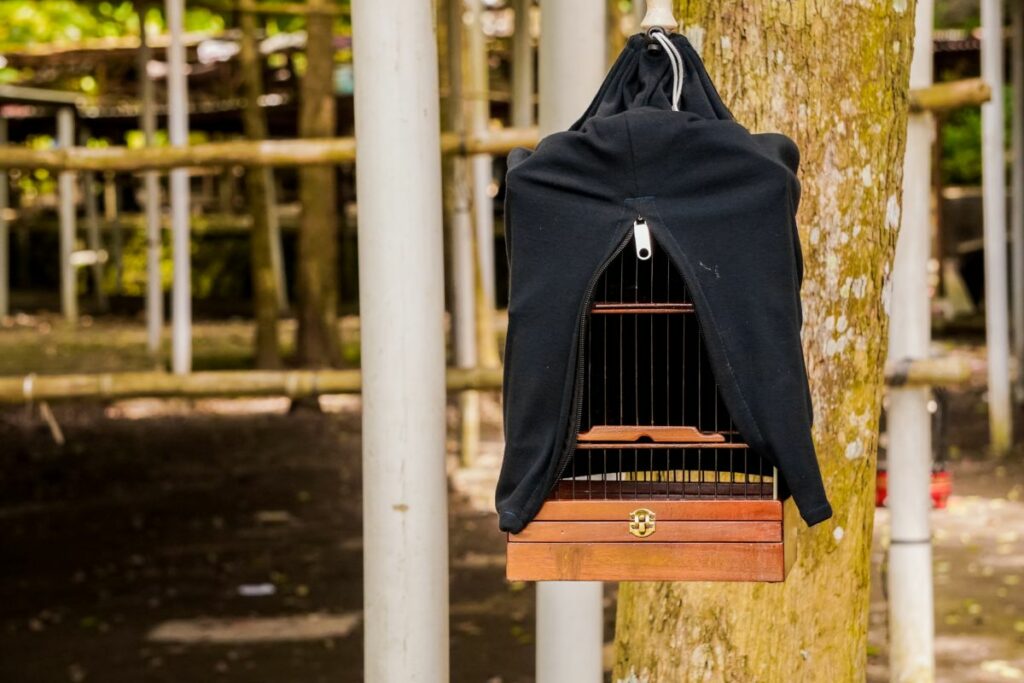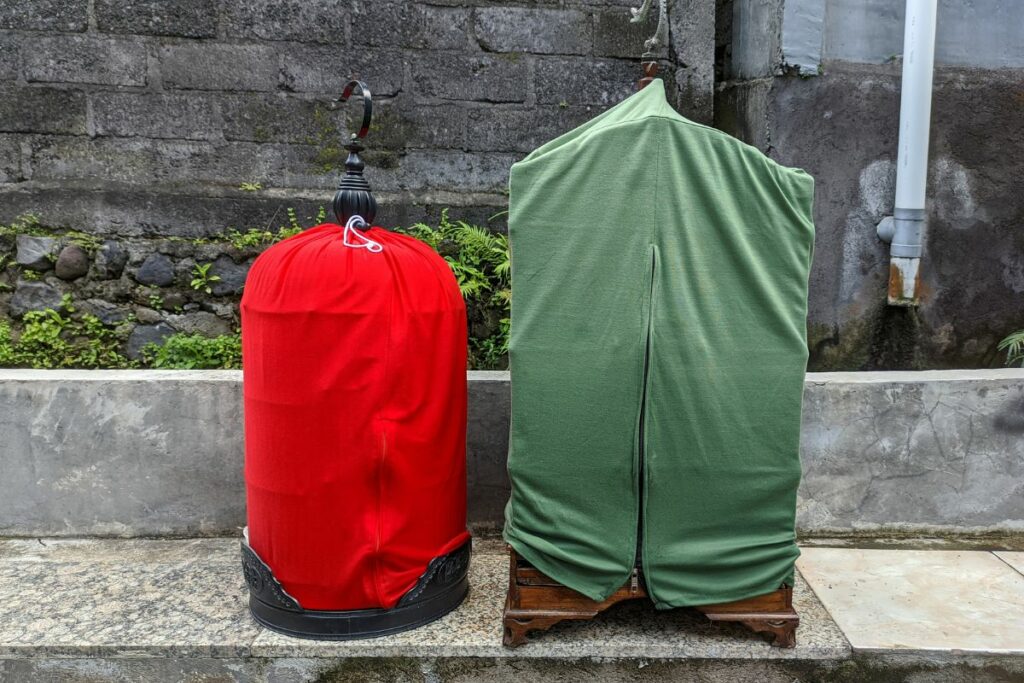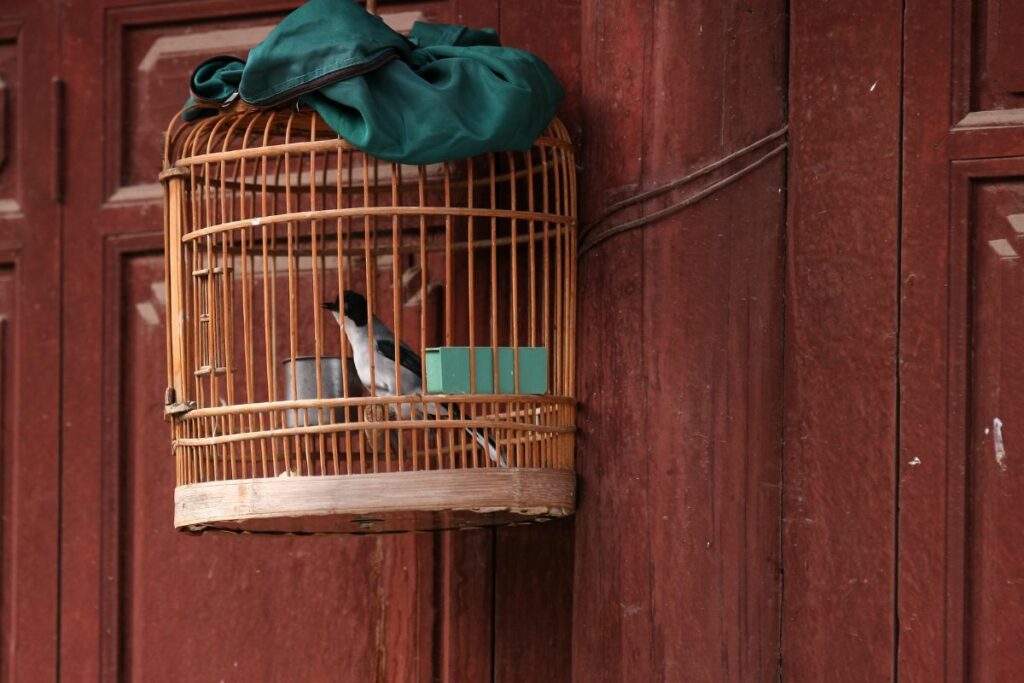As an Amazon Associate, we earn from qualifying purchases with no additional costs for you.
Many people have pet birds at home. One of the difficulties that many bird owners face is knowing how to care properly for their bird companions. Caring for a pet bird requires much more than just providing the correct food; it also means setting up a cage or aviary where the bird can feel comfortable and thrive.
Birds get quiet when covered due to the reduction of light, mimicking nighttime, when most birds sleep; the covering provides a sense of security, making the bird feel safe and relaxed, and a covering engages a bird’s roosting instinct, causing them to become quiet to avoid attracting predators.
Birds become quiet when their cage is covered because it makes them think it is nighttime. Many birds like being covered, but this varies. Covering a cage can help calm an anxious bird and make them feel safe. However, birds should not be covered at night if conditions are very hot.
Read on to learn more about covering birds.
TIP: If you want to check out the best pair of binoculars for bird watching, we recommend a pair of waterproof and fog-proof 8 x 42 binoculars like the Celestron – Outland X 8×42 Binoculars (Amazon link).
Do Birds Like Being Covered?
Different types of birds vary in if they like being covered, and this also depends on the reason you are covering the cage. You should not cover a cage during the day when the bird needs to eat and drink.
Wild birds continue to feed and drink until the sunset and they will begin again as soon as the sun rises, so your pet bird should be uncovered during the daytime so that it will feed and drink enough.
It is also a bad idea to cover the bird cage because your bird is being noisy. Some bird species are much louder than others and this cannot be altered by covering the cage.
This means that you should do your research before bringing a pet bird home. Certain types of birds, such as cockatoos, are very loud, while other birds, such as finches, are not.
Depending on your living situation, you need to decide how much space you have for the bird and how much noise you are willing to tolerate. This can be an issue if you are renting an apartment because a noisy bird may not be appreciated by your neighbors or landlord.
Why Do Birds Get Quiet When Covered?
There are a number of reasons why a bird gets quiet if you cover its cage.
1. Reduction In Light
The act of covering the cage takes away most of the light. This means that the bird may think it is bedtime. In the wild, birds notice changes in light and will begin to roost as the sun starts to set. Birds have a diurnal rhythm where the activity changes over a 24-hour period.
2. Sense Of Security
Covering a cage can help a bird feel safe and protected from potential predators. They also often associate being covered with bedtime, a time when they can rest and relax.
3. Avoiding Predators
Since covering a cage is a signal to a bird that it is night-time, their instinct is to quieten down. Not only is this because the bird is getting ready to sleep, but they also need to be quiet to avoid attracting the attention of a predator.
When birds roost at night, they are sometimes noisy if they are in a large group (e.g., starlings or mynahs), but once the sun goes down, the birds settle and become silent.
Jackdaws also roost in large flocks and vocalize when they first come together to roost. Then in the morning, these birds will also vocalize and decide together when they should leave the roost.
Research shows that this communication in the group allows them to fly en masse from the roost. Presumably, as a way to help reduce predation.
Why Do Birds Calm Down When Covered?
A cover over the cage can make a bird feel secure, especially if it is a cover they are used to having over their cage.
While normally you shouldn’t cover a bird cage during the day, there are, however, some exceptions. If you are taking a bird to the vet and the bird is anxious, then covering the cage (at least partially) may be a good idea.
Partly covering a cage can stop the bird from seeing what they will perceive as potential predators while you are transporting it to the vet.
It is often useful to cover the cage on three sides with a sheet and make sure the bird can see you. This will help to reassure the bird while stopping the bird from seeing what else is going on in the environment. This can help keep the bird calm. A sick bird needs to be kept calm and warm.
If you have a bird carrier, then this is often better than transporting an entire cage. However, some birds panic excessively when placed in a carrier, so this may be a challenge to use. It is a good idea to familiarize your bird with a bird carrier if this is what you may need to use one day.
Is It OK to Cover Birds At Night?
It depends on where you live and on the ambient temperatures as to if it is a good idea to cover birds at night. Covering a bird’s cage at night if it is very hot is not a good idea as the bird may overheat.
It also depends on the species of birds because some birds have a lot of powder down from their feathers which means they need good ventilation in the cage. There are specific dos and don’ts for covering a parrot’s cage at night.
It is best to not keep lights on if you want your bird to get a good night’s sleep. Similar to humans, birds need to get enough peaceful sleep to remain healthy.
Tips For Covering Birds At Night
In cool conditions, the bird cage can be covered at night. The type of cover can vary from a sheet to a blanket, depending on the temperature. In very cold conditions, a blanket can be used. You mustn’t let your bird get too hot or too cold, though.
It is best to introduce your bird to sheet covers or blankets while they are still very young, and that you do not change these covers.
Birds do not adjust easily to new items placed in or over the cage Using a new cover may trigger panic in the bird, causing it to thrash about and injure itself.
Some pet birds, namely parrots, are inclined to chew on objects. This can be a problem because the bird may decide to chew and ingest parts of its cage cover. This can lead to a dangerous obstruction in the bird’s gut requiring a vet visit. Any obstruction can be deadly.
It is recommended to use pegs to attach the cover so that it is some distance from the cage bars. This way, the bird cannot reach the cover to chew it up.
Covering Cages And Reproductive Behavior
The time when you cover the cage can affect the mood of a bird. When birds reach a certain age, they become hormonal as their bodies prepare for reproduction. This can become a problem with pet birds since they still have these same issues but are in an artificial environment.
One trigger for bird reproduction is photoperiod. During the breeding season, days are usually longer and nights are shorter. Birds like pet mynahs become more aggressive during the breeding season as their bodies sense this shift in photoperiod.
One strategy to reduce aggression is to still cover the cage in spring and summer at the same time in the evening (what was sunset) as you did in winter.
You can safely do this provided it is not too hot and provided that the bird is not covered for more than 8 hours at a time.
Covering Cages And Night Frights
In my own experience, night frights are a particular problem with cockatiels. Other pet birds may also experience this. Night fright is when a bird suddenly becomes frightened in the middle of the night. Birds may become frightened by a sudden noise and by seeing a shadow.
The biggest concern with a night fright is that the bird may injure itself while thrashing about in the cage. Not only can a very stressed bird die from fright, but it can break feathers and even bones. It is very important to prevent birds from experiencing such night frights.
To help prevent a night fright, it is best to make sure the cage is covered so that the bird won’t suddenly be disturbed. Keep the cage in the same place in the house and avoid going near the cage at night when you could accidentally frighten your bird.
TIP: Are you looking for high-quality food for wild birds on your backyard? I recommend using Wagner’s products with the highest quality grains used in blending and made in the USA (Amazon links):
– Deluxe Treat Blend Wild Bird Food
– Eastern Regional Wild Bird Food
– Western Regional Wild Bird Food
– Midwest Regional Wild Bird Food
– Southern Regional Wild Bird Food
Conclusion
Caring for a pet bird means making sure they are in a safe and secure environment. Covering the cage is an option, but this varies by bird species.
Birds become quiet when covered because the cover signals to the bird that night is approaching because the light is reduced. Another reason birds quieten after being covered is that they feel secure in the cage. This is especially the case if they are used to being covered.



